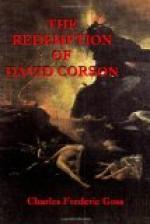“Love you!” he cried; “your face has been the last vision upon which I gazed when I fell into a restless slumber, and the first which greeted returning consciousness, when I waked from my troubled dream. My life has been but a fragment since we parted; a part of my individuality seemed to have been torn away. I have always felt that neither time nor space could separate us for—”
At that instant the horse which had stood patiently beside them on the bridge, shook his head, rattled his bridle and whinnied.
“Poor fellow! I had forgotten all about him in my joy!” said David, starting at the sound, and patting his shoulder. “You have had a hard run, and are tired and hungry. I must get you to the barn and feed you. They will miss you at the stable to-night, but I will send you back to-morrow, or ride you myself, that is if Pepeeta wishes to be rid of me.”
He said this teasingly, but smiled at her,—a tender and confident smile.
“Oh! you shall never leave me again—not for a moment,” she cried, pressing his arm against her heart.
He paused a moment and looked down as if a new thought had struck him.
“What is the matter?” she asked.
“Do you think they will welcome me at home?” he said, with a penitence and humility that touched her deeply.
“Welcome you home?” she exclaimed; “you do not know them, David. They talk of nothing else. They have sent messages to you in every direction. The door is never locked, and there has never been a night since you disappeared that a candle has not burned to its socket on the sill of your window; what do you think of that? You do not know them, David. They are angels of mercy and goodness. I have been selfish in keeping you so long to myself. Come, let us hasten.”
Just at that instant a loud halloo was heard—“Pepeeta, Pepeeta, Pepeeta!”
“It is Steven—the dear boy! He has missed me. You have a dangerous rival, David.”
She said this with a merry laugh and cried out, “Steven, Steven, Steven!”
“Where are you?” he called.
“I am here by the bridge!” she cried, in her silvery treble.
“She is here by the bridge!” The deep bass voice of her lover went rolling through the woods.
There was silence for a moment, and then they heard
a joyous shout,
“Uncle David! Uncle David! Oh!
Mother, Father, it is Uncle David.”
There was a crashing in the bushes, and the great half-grown boy bounded through them and flung himself into the arms extended to him, with all the trust, all the love, all the devotion of the happy days of old.
CHAPTER XXXIII.
A SELF-IMPOSED EXPIATION
“Man-like is it
to fall into sin,
Fiend-like is it to
dwell therein,
Christ-like is it for
sin to grieve,
God-like is it all sin
to leave.”
—Friedrich
von Logau.




